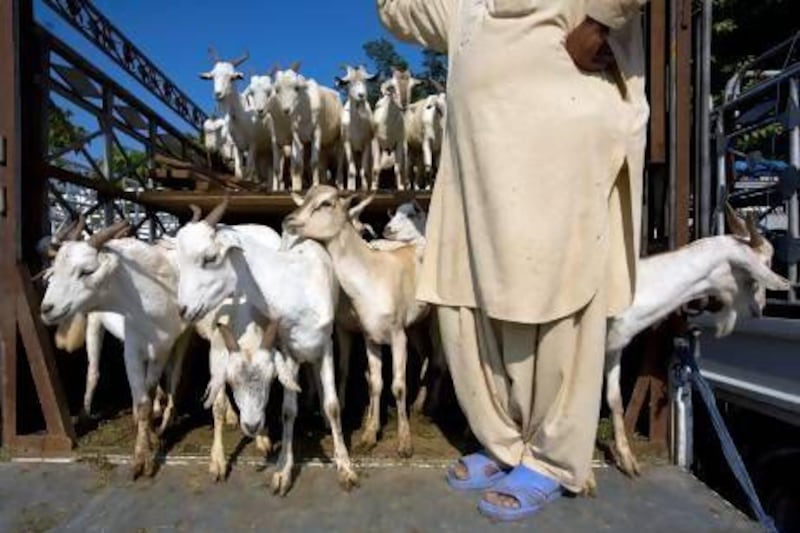ABU DHABI // Hundreds of thousands of tonnes of animal feed are being shipped in from the emirate’s expanding agriculture ventures abroad.
Jenaan Investment, a privately owned company based in Abu Dhabi, is enlarging its farmland holdings in Egypt, Sudan, the US and Spain to grow feed. “Our chairman found that Egypt and Sudan were the best places to invest and to cultivate forage,” said Ziad Shaat, general manager of Jenaan. “We created a very solid base in those countries now.”
Mr Shaat was speaking last week at SIAL, the region’s largest food exhibition, organised by the Abu Dhabi Food Control Authority.
The company is growing 60,000 tonnes of corn, barley, silage and alfalfa grass in Egypt. Half of that is sent to the food authority and half is sold to private Egyptian companies.
Three months ago Jenaan started packing silage, a type of forage for cattle, sheep and goats, using a high-tech system from Austria. “The technology ensures the product’s freshness because it’s wrapped and baled immediately so there’s no possible contamination,” Mr Shaat said.
Other methods can expose the feed to rats, he said. Animal feed requires a lot of water to grow, and where water is scarce companies must look elsewhere for sources.
“There is no alternative other than to look at having a supply in countries that have the right conditions,” said Nicholas Lodge, managing partner of the Abu Dhabi agriculture consultancy Clarity. “This means sufficient water, suitable soil and a climate that admits production in the hot months of the year.”
Rhodes grass, a pasture feed, was grown in the UAE until the Government halted its planting in 2010 because it used so much water.
Before then it accounted for three of every five litres of water used in agriculture.
"Realistically, imported fodder is a fact of life for livestock production in the UAE" and its neighbours, Mr Lodge said.
Jenaan is lifting production abroad. In April, it started a 5,000-hectare pilot project on 100,000 leased hectares in Sudan to grow alfalfa.
“This project is unique because we’re using an irrigation system called the floppy sprinkler, which has been successful in South Africa,” Mr Shaat said. The system uses poles with sprinklers on top placed every 12 metres, which water the crops like fountains. “It’s good because we can control the size of the water droplets so it won’t evaporate,” Mr Shaat said. “In the traditional pivot system you lose about 10 per cent of your area, so we cover more.”
The pilot project, which can generate between 50,000 and 70,000 tonnes of feed a year, is expected to finish by the end of the month.
In four months, the company will extend the project to 12,000 hectares and all of the feed produced will be shipped to Abu Dhabi.
So far, the company’s projects have cost about Dh600 million and they are still growing. It is awaiting approval to lease land in Ethiopia.
“We’re still studying what to grow there,” Mr Shaat said. “We sent consultants from Italy to study the soil and give us recommendations.”
Each farm has a 25-year, renewable lease.
Jenaan is producing about 150,000 tonnes of grass from farmers in the US and 300,000 tonnes of feed from Spain. “As long as animals are going to be fed and maintained in the region, importing animal feed is the reality of life,” Mr Lodge said.






